Only in Cape Town
Hope takes the form of football
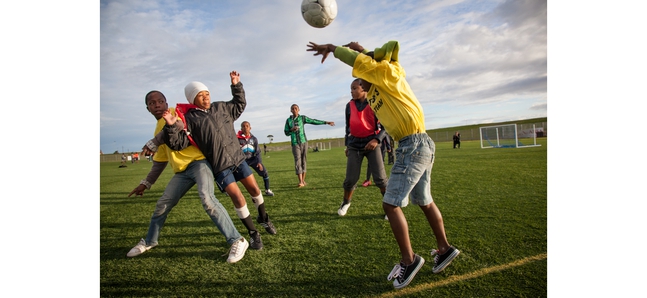
Posted: Tue Jan 07 2014
The word you’ll hear shouted at any football match being played in South is 'Laduuuuuuuuuuma!' whenever a goal is scored. This Zulu word means 'it thunders', and that is exactly how South Africans who are passionate about the game react.
But up until 2008, in Gansbaai, a small rural fishing village about two hours from Cape Town hadn’t heard that word, or felt that passion much. That was until the Football Foundation of South Africa was established there. After the Premier League donated turf for the site, and the Grootbos Foundation established a sports facility with the help of some banking sponsors, that was set to change.
This resulted in gleaming new sports facilities, with a full-size artificial football pitch, two rugby fields, a grass soccer pitch, hockey pitch, cricket pitch and cricket nets, athletics track, dual-purpose netball and tennis courts and a fully-equipped clubhouse with kitchen and shower facilities. It was quite an achievement for a sleepy little coastal town.
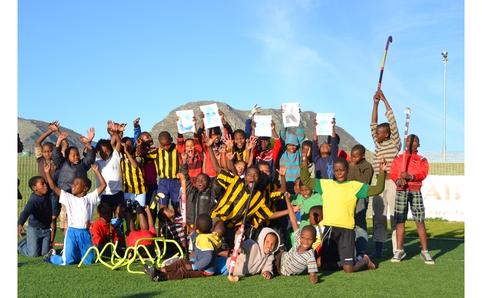
But the community of around 25,000 people was a troubled one: the white, black and coloured people didn’t interact much and social barriers were solid. After coaches approached local schools, the football programmes started reaching both boys and girls from all the communities. Leán Terblanche, the Football Foundation’s programme director says: 'Our mission is to cultivate the potential of sport to empower individuals and trigger positive social change in marginalised communities.'
'Our aim was to improve social cohesion and to break down racial barriers, which proved to be difficult in a place where cultural prejudices were deeply ingrained in the mindsets of many people. Despite the gleaming new clubhouse and evergreen pitch, there was resistance to the centre and our programmes. We were also opposed by a local sports club, making it difficult for us to carry on at times, but our coaches continued canvassing at schools and in the communities gaining support from teachers and parents, and winning the hearts of children.' And as a woman working in the male-dominated field of sports, Leán had even more challenges to overcome: 'I had my fair share of opposition. After months of consultation and talks in the township, the football fraternity eventually recognised us (albeit cautiously and with reservation). It would take a couple of years before they really accepted and started supporting our programmes.'
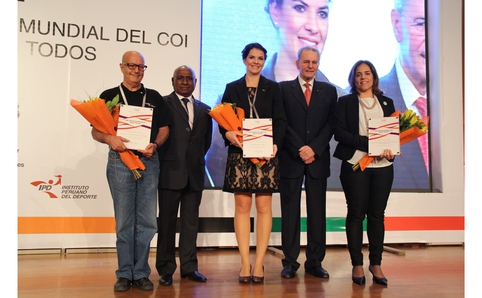
The Football Foundation’s programme director Leán Terblanche (centre) accepting the Sports Facilities and Public Spaces Grant at the 15th International Olympic Committee Conference on Sport for All held in Lima, Peru, in 2013.
But now, after five years, the difference this centre makes in children’s lives is remarkable and fundamental. Working with Coaches Across Continents since 2011 has also proved invaluable to the local coaches. International coaches come in to train the local coaches and develop curriculums, which address the local needs and are therefore sustainable. It also includes the environment, health, nutrition and food security. 'The training provided by Coaches Across Continents has greatly contributed to empowering our coaches and increase their skills to reach out to more children in a more impactful way,' Terblanche says. In terms of numbers, over 2,000 children are directly impacted through this endeavour every year. Volunteering as well as a mentoring programme have ensured that there is a constant and varied input of positive reinforcement in the local children’s lives.
But what is it that really makes football such a great catalyst for social change and improvement? According to Terblanche: 'Football is a universal language and played by millions of young people around the world. The game has a powerful gravitational pull and binds people together; it is a common language understood throughout the world. It can be played anywhere from township streets and open plains to gleaming football stadiums. Football can be an escape from everyday hardships and unite people, unlock potential and empower individuals. So many children grow up in South African communities with little hope, little love and very little self-esteem. Sport provides a pathway for these children to belong to a family, to develop their talent and potential.'
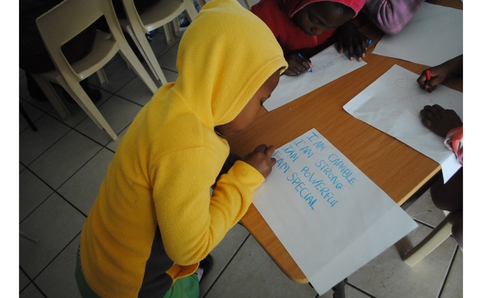
Training sessions are fantastic times: coaches are often greeted by up to 100 excited children waiting on the pitch. Seeing the change in young people that the Football Foundation enables is what inspires Terblanche every day. She has been with the project since its inception and seen the little girls and boys mature into responsible, upstanding and proud young leaders in the community. But there’s one person who stands out for her: 'Definitely one of the highlights for me was seeing our Junior Coach Mziyanda from the local township come through the youth programme as a player, graduating through the Breaking Barriers coaches’ course and now being an incredible role model, coach, community leader and mentor for the children in our programmes. People like Mziyanda is what the Football Foundation is about. Opportunities, leadership and success, against all odds.'
But it’s not only about sport: many of the programmes include social and environmental aspects too, such as HIV/Aids education. While the Dibanisa environmental education programme takes 20 children at a time and educates them through activites in nature. Over a period of seven weeks they learn about eco-systems, recycling, marine life, sustainable food production and local fynbos in an interactive and engaging manner. The Football Foundation has received international recognition for its community work, and it aims to extend opportunities further in the geographical area. It can be used as a benchmark for best practice on sustainable development in the whole of South Africa.
And now, when you hear the shout of 'Laduma' echoing over a football field, at the end of Africa, it’s not just young people’s bodies that are charged with fervour, but their hearts and minds too.
For more information visit The Football Foundation
Tweets
- About Us |
- Work for Time Out |
- Send us info |
- Advertising |
- Mobile edition |
- Terms & Conditions |
- Privacy policy |
- Contact Us
Copyright © 2014 Time Out Tokyo




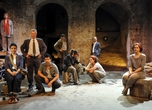

Add your comment